1930s
Artwork Khrushchev Probably Would Not Have Liked 34
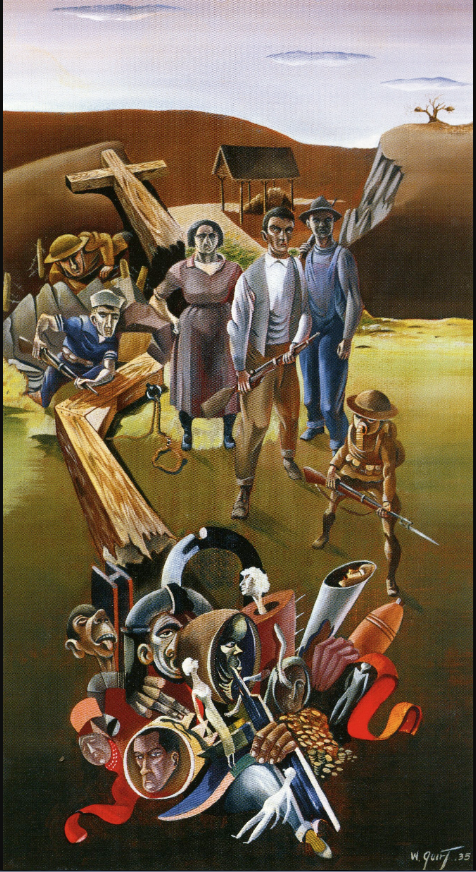
Walter Quirt (1902–1968), "The Future Is Ours" (1935)
Posted By: Paul - Thu Apr 29, 2021 -
Comments (0)
Category: Art, Surrealism, 1930s
The Science of Mental Physics
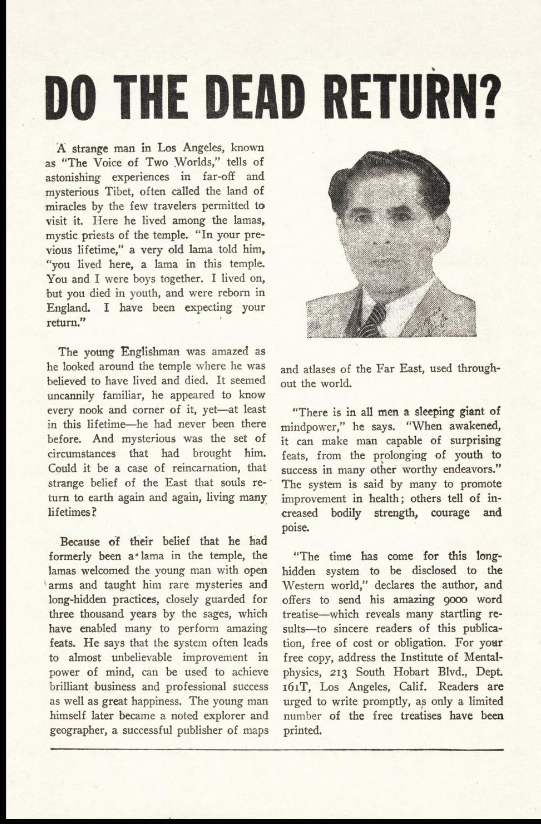
Source of ad.
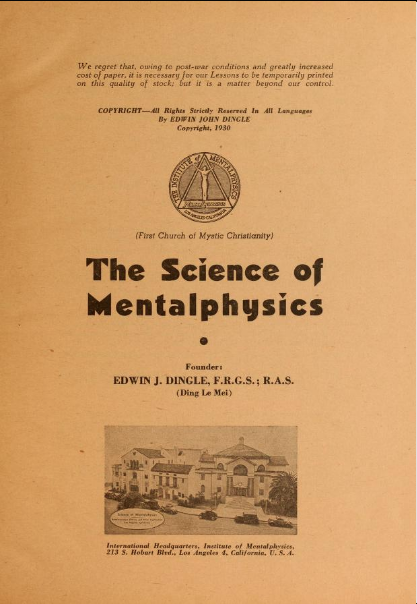
Read the whole text here.
Posted By: Paul - Mon Apr 26, 2021 -
Comments (4)
Category: Cult Figures and Artifacts, New Age, Supernatural, Occult, Paranormal, 1930s, 1940s
Fingernail Birthday Party—and Necklace
Read the whole story with more pix here.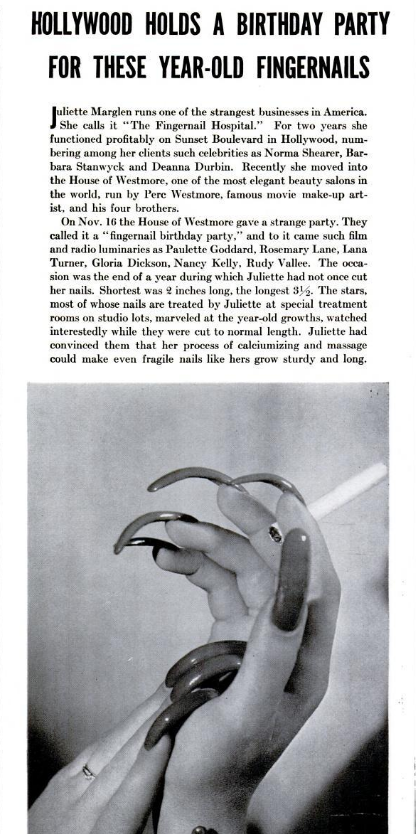
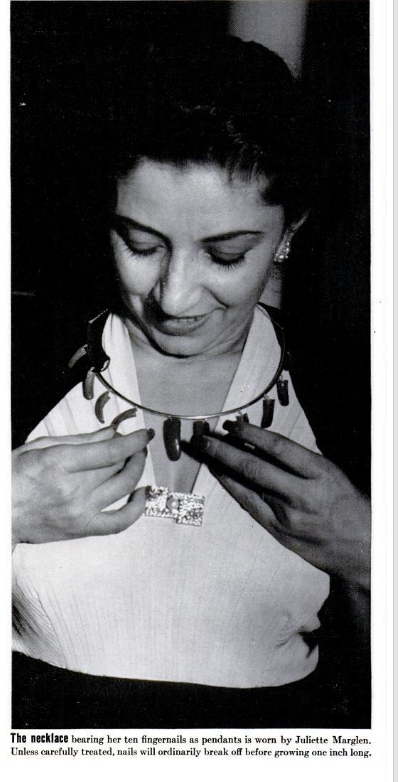
Posted By: Paul - Sat Apr 17, 2021 -
Comments (0)
Category: Beauty, Ugliness and Other Aesthetic Issues, Body, Human Marvels, Movies, Publicity Stunts, 1930s
Dancing on the Moon
Posted By: Paul - Wed Apr 14, 2021 -
Comments (1)
Category: Anthropomorphism, Babies, Cartoons, 1930s, Sex Lives Worse Than Yours
Avoid Undie Odor
Throughout the 1930s and 40s, the marketing team for Lux soap repeatedly warned consumers that if they didn't wash their clothes everyday, they risked having "undie odor". Some details from Suellen Hoy in her book Chasing Dirt: The American Pursuit of Cleanliness:Francis Countway, the president of Lever Brothers and the individual most responsible for the "discovery" of body odors and the "stop smelling" ad pitch, was inspired by Listerine's successful advertising campaign against the previously unknown halitosis. Countway and his associates admitted, while Lever Brothers' business boomed, that they cared little "about the opinions of softies who think that the Body and Undie Odor copy is disgusting." They were simply doing their job, "bringing cleanliness into a dirty world."
Lux soap was also responsible for the "undies are gossips" campaign.

Wilmington Evening Journal - Feb 9, 1932

Kansas City Star - Apr 24, 1940
Posted By: Alex - Thu Apr 08, 2021 -
Comments (4)
Category: Hygiene, Advertising, Underwear, 1930s, Smells and Odors
Manly Bosoms Indecent
1934: Coney Island police continued to crack down on male bathers who adopted the new fashion of topless bathing suits.As for the female bathers:
"But if it's indecent we won't allow it," he said.

Windsor Star - May 15, 1934
Posted By: Alex - Mon Apr 05, 2021 -
Comments (1)
Category: Censorship, Bluenoses, Taboos, Prohibitions and Other Cultural No-No’s, Fashion, Swimming, Snorkeling, and Diving, 1930s
Goliath Messiah, the backward-running mystic
1938: Bronx-resident Goliath Messiah celebrated his 72nd birthday by running backwards for three miles. This was an annual birthday tradition for him. He attributed his good health to a diet of "tree bark, fruit, green vegetables and a pint of wine daily." Also, he claimed to be a descendant of Xerxes.Later he moved to Death Valley where, he predicted, his daily five-mile hikes would allow him to live to be 150. I haven't been able to find out what age he actually was when he died. I suspect Goliath Messiah wasn't the name the government knew him by, which makes it difficult to get info about him.


Los Angeles Times - Apr 25, 1938

San Bernardino County Sun - July 22, 1941
Posted By: Alex - Wed Mar 17, 2021 -
Comments (0)
Category: Eccentrics, 1930s
Old Age Rejuvenator Centrifuge
It would probably work about as well as any other anti-aging treatment.More info: Modern Mechanix

Science and Mechanics - Aug 1935

Posted By: Alex - Tue Mar 02, 2021 -
Comments (3)
Category: Elderly and Seniors, Inventions, 1930s
The Sundae of Tomorrow
The centerpiece of the 1939 New York World's Fair was a pair of structures known as the Trylon and Perisphere. Even today, they look very futuristic.
It occurred to some that the structures looked a bit like a scoop of ice cream and an upside-down cone. This inspired ice-cream parlors throughout America to offer what they called the "World's Fair Sundae" or the "Sundae of Tomorrow".


Hagerstown Daily Mail - July 21, 1939
It's a nice looking sundae. I'd get one if they were offered today. Though now the reference would be lost on most people.
Posted By: Alex - Fri Feb 19, 2021 -
Comments (3)
Category: Food, Junk Food, 1930s

| Who We Are |
|---|
| Alex Boese Alex is the creator and curator of the Museum of Hoaxes. He's also the author of various weird, non-fiction, science-themed books such as Elephants on Acid and Psychedelic Apes. Paul Di Filippo Paul has been paid to put weird ideas into fictional form for over thirty years, in his career as a noted science fiction writer. He has recently begun blogging on many curious topics with three fellow writers at The Inferior 4+1. Contact Us |




